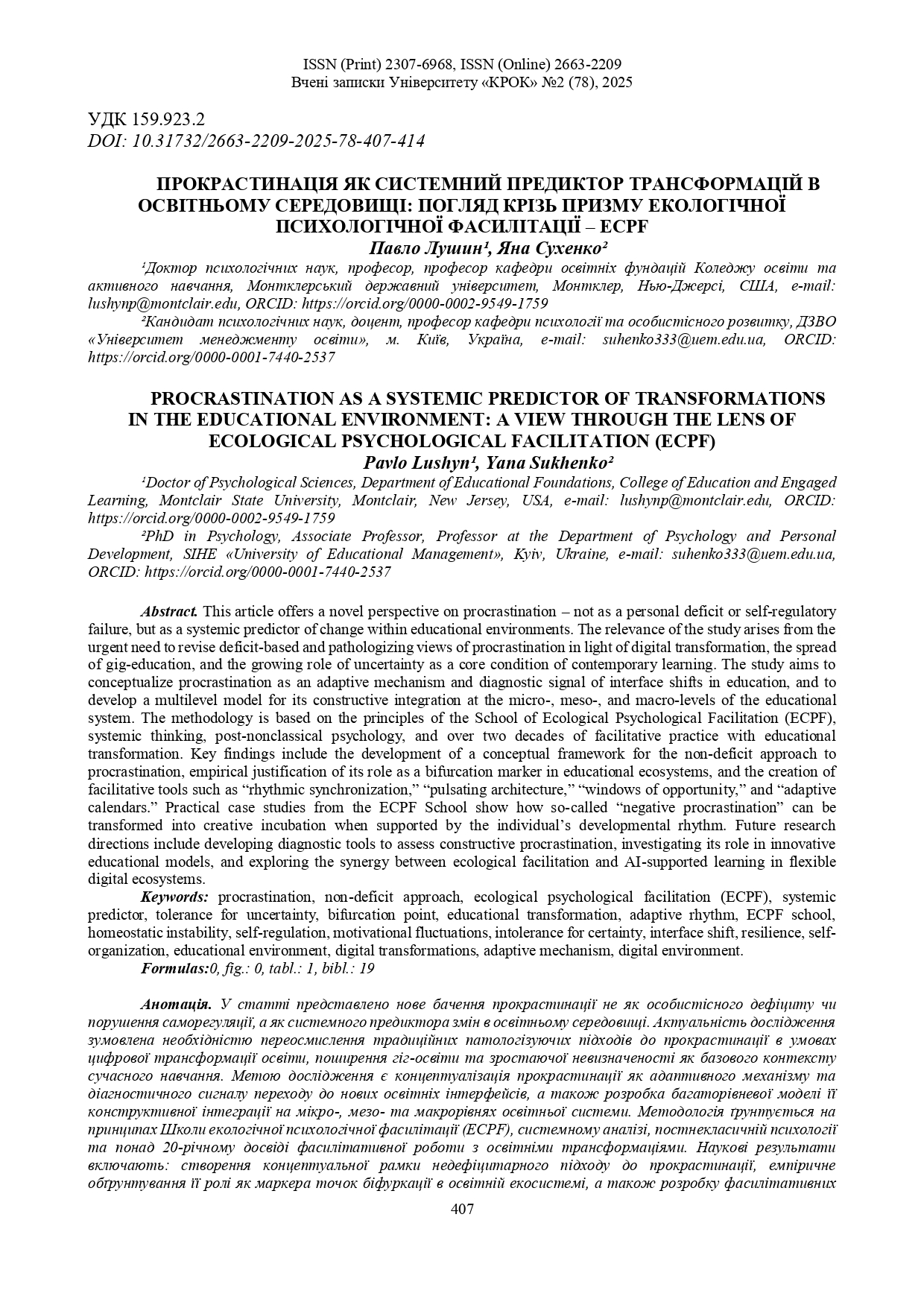ПРОКРАСТИНАЦІЯ ЯК СИСТЕМНИЙ ПРЕДИКТОР ТРАНСФОРМАЦІЙ В ОСВІТНЬОМУ СЕРЕДОВИЩІ: ПОГЛЯД КРІЗЬ ПРИЗМУ ЕКОЛОГІЧНОЇ ПСИХОЛОГІЧНОЇ ФАСИЛІТАЦІЇ – ECPF
DOI:
https://doi.org/10.31732/2663-2209-2025-78-407-414Ключові слова:
прокрастинація, недефіцитарний підхід, екологічна фасилітація – ECPF, системний предиктор, толерантність до невизначеності, точка біфуркації, трансформація освіти, адаптивний ритм, Школа екопсихологічної фасилітації, гомеостатична нестабільність, саморегуляція, мотиваційні флуктуації, інтолерантність до визначеності, інтерфейсний зсув, резильєнтність, самоорганізація, освітнє середовище, цифрові трансформації, адаптивний механізм, цифрове середовищеАнотація
У статті представлено нове бачення прокрастинації не як особистісного дефіциту чи порушення саморегуляції, а як системного предиктора змін в освітньому середовищі. Актуальність дослідження зумовлена необхідністю переосмислення традиційних патологізуючих підходів до прокрастинації в умовах цифрової трансформації освіти, поширення гіг-освіти та зростаючої невизначеності як базового контексту сучасного навчання. Метою дослідження є концептуалізація прокрастинації як адаптивного механізму та діагностичного сигналу переходу до нових освітніх інтерфейсів, а також розробка багаторівневої моделі її конструктивної інтеграції на мікро-, мезо- та макрорівнях освітньої системи. Методологія ґрунтується на принципах Школи екологічної психологічної фасилітації (ECPF), системному аналізі, постнекласичній психології та понад 20-річному досвіді фасилітативної роботи з освітніми трансформаціями. Наукові результати включають: створення концептуальної рамки недефіцитарного підходу до прокрастинації, емпіричне обґрунтування її ролі як маркера точок біфуркації в освітній екосистемі, а також розробку фасилітативних інструментів – таких як «ритмічна синхронізація», «пульсуюча архітектура», «вікна можливостей» та «адаптивні календарі». Практичні кейси з досвіду Школи ECPF демонструють, як так звана «негативна прокрастинація» може перетворюватися на продуктивну інкубацію за умови підтримки індивідуального ритму розвитку особистості. Перспективи подальших досліджень пов’язані з розробкою діагностичних інструментів для оцінки конструктивної прокрастинації, вивченням її ролі в інноваційних освітніх моделях, а також дослідженням взаємодії між екологічною психологічної фасилітацією та AI-асистованим навчанням у гнучких цифрових середовищах.
Завантаження
Посилання
Журавльова, О.В., & Журавльов, О.А. (2020). Розробка та апробація методики діагностики особистісного конструкту прокрастинації. Науковий вісник Херсонського державного університету. Серія Психологічні науки, 3(1), 42–46. https://pj.journal.kspu.edu/index.php/pj/article/view/321
Лушин, П. В. (2020). «Гіг-освіта» як альтернатива НУШ. Г. М. Бевз (Ред.) Матеріали Всеукраїнської науково-практичної конференції «Технології формування позитивної громадської думки щодо освітніх інновацій». Вісник психології і педагогіки, 26. Київ: ІСПП НАПН України. https://bit.ly/3GmXixX
Лушин, П. В., & Сухенко, Я. В. (Ред.). (2021). REHI-світ: особистісно-професійний розвиток і психологічна допомога майбутніх психологів. Полтава: Мирон І. А. 176 с. (Серія «Жива книга»; Т.6).
Chu, A. H. C., & Choi, J. N. (2005). Rethinking procrastination: Positive effects of "active" procrastination behavior on attitudes and performance. The Journal of Social Psychology, 145(3), 245–264. https://doi.org/10.3200/socp.145.3.245-264
Ferrari, J. R., Johnson, J. L., & McCown, W. G. (1995). Procrastination and Task Avoidance: Theory, Research, and Treatment. Springer.
Grunschel, C., Patrzek, J., & Fries, S. (2013). Exploring reasons and consequences of academic procrastination: An interview study. European Journal of Psychology of Education, 28(3), 841–861. http://dx.doi.org/10.1007/s10212-012-0143-4
Jalili, F., Arefi, M., Ghamarani, A., & Manshei, G. (2024). Effectiveness of self-determination training on self-handicapping and academic procrastination among students. Journal of Adolescent and Youth Psychological Studies, 5(9), 109–118. https://doi.org/10.61838/kman.jayps.5.9.13
Lushyn, P. (2024). Procrastination as a predictor of systemic changes in the educational environment. In Psychological predictors of personality social development in modern conditions of educational environment: Proceedings of the I All-Ukrainian scientific-practical internet conference with international participation (pp. 88-89). Igor Sikorsky Kyiv Polytechnic Institute. https://psy.kpi.ua/wp-content/uploads/2025/01/Zbirnyk-tez-konferentsii-Psykhol_predyktory_-2024_compressed.pdf
Muñoz-Olano, J., & Hurtado-Parrado, C. (2017). Effects of goal clarification on impulsivity and academic procrastination of college students. Revista Latinoamericana de Psicología, 49, [сторінки не вказано]. https://doi.org/10.1016/j.rlp.2017.03.001
Nik Andam Kermanshahi, H., Safaei Rad, I., Erfani, N., & Yar Ahmadi, Y. (2021). The role of negative perfectionism, difficulty in emotional regulation and self-disability in predicting academic boredom in high school male students. Journal of School Psychology, 10(2), 155–180. https://jsp.uma.ac.ir/article_1184.html?lang=en
Odaci, H. (2011). Academic self-efficacy and academic procrastination as predictors of problematic internet use in university students. Computers and Education, 57(1), 1109–1113. https://doi.org/10.1016/j.compedu.2011.01.005
Özer, B., & Saçkes, M. (2011). Effects of academic procrastination on college students’ life satisfaction. Procedia - Social and Behavioral Sciences, 12, 512–519. https://doi.org/10.1016/j.sbspro.2011.02.063
Ragusa, A., González-Bernal, J., Trigueros, R., Caggiano, V., Navarro, N., Minguez-Minguez, L. A., Obregón, A. I., & Fernandez-Ortega, C. (2023). Effects of academic self-regulation on procrastination, academic stress and anxiety, resilience and academic performance in a sample of Spanish secondary school students. Frontiers in Psychology, 14. https://doi.org/10.3389/fpsyg.2023.1073529
Rahimi, S., Hall, N. C., & Sticca, F. (2023). Understanding academic procrastination: a longitudinal analysis of procrastination and emotions in undergraduate and graduate students. Motiv. Emot. 47, 554–574. https://doi.org/10.1007/s11031-023-10010-9
Sagone, E., & Indiana, M. L. (2023). The Roles of Academic Self-Efficacy and Intolerance of Uncertainty on Decisional Procrastination in University Students during the COVID-19 Pandemic. Education Sciences, 13(5), 476. https://doi.org/10.3390/educsci13050476
Shin, J., & Grant, A. M. (2021). When putting work off pays off: The curvilinear relationship between procrastination and creativity. Academy of Management Journal, 64(3), 772–798. https://doi.org/10.5465/amj.2018.1471
Steel P. (2007). The nature of procrastination: a meta-analytic and theoretical review of quintessential self-regulatory failure. Psychological bulletin, 133(1), 65–94. https://doi.org/10.1037/0033-2909.133.1.65
Steel, P. (2022). The procrastination equation: How to stop putting things off and start getting stuff done (2nd ed.). Harper. https://ia800107.us.archive.org/30/items/iqraapdf-the-procrastination-equation-arabic/IQRAAPDF-The-Procrastination-Equation.pdf
van Eerde, W., & Klingsieck, K. B. (2018). Overcoming procrastination? A meta-analysis of intervention studies. Educational Research Review, 25, 73–85. https://doi.org/10.1016/j.edurev.2018.09.002

Downloads
Опубліковано
Як цитувати
Номер
Розділ
Ліцензія

Ця робота ліцензується відповідно до Creative Commons Attribution-NonCommercial 4.0 International License.

